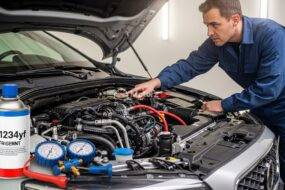Radiator Leaks Causes and repair options. A well-functioning radiator is crucial for the optimal performance of your vehicle’s cooling system. However, radiator leaks can be a common and troublesome issue for many car owners. In this article, we will explore the various causes of radiator leaks and discuss the available repair options.
Corrosion:
Radiator Leaks One of the primary causes of radiator leaks is corrosion. Over time, the metal components of the radiator can corrode due to a combination of water, oxygen, and the materials used in the radiator construction. Corrosion weakens the radiator’s structure, leading to leaks. Excessive pressure within the cooling system can result in radiator leaks. This may be caused by a malfunctioning radiator cap or a faulty pressure release valve. High pressure puts additional stress on the radiator, causing it to develop leaks over time.
Physical Damage:
Accidents, collisions, or even road debris can cause physical damage to the radiator. A bent or punctured radiator is prone to leaking. Regular inspection of the radiator for visible damage is essential to catch such issues early. Over time, these hoses can become worn, brittle, or develop cracks. A damaged hose can lead to coolant leakage, compromising the radiator’s efficiency.
Faulty Seals:
The radiator is assembled with various seals to prevent leaks. Over time, these seals may deteriorate or become damaged, resulting in coolant seepage. Checking and replacing faulty seals is crucial for preventing leaks. For minor leaks, radiator stop leak additives can be a temporary solution. These products work by circulating through the cooling system and sealing small leaks. While they may provide a quick fix, it’s essential to address the root cause of the leak for a more permanent solution.
Patch Kits:
Patch kits are available for repairing small leaks in the radiator. area. While effective for minor leaks, they may not be a suitable solution for more extensive damage. In cases of severe corrosion or irreparable damage, replacing the entire radiator is often the most effective solution. Modern radiators come in various materials, including aluminum and plastic, providing durability and resistance to corrosion.
Professional Repairs:
For complex leaks or issues involving internal components, seeking professional help is advisable. Experienced mechanics can conduct a thorough inspection, identify the root cause of the leak, and perform necessary repairs or replacements. Regular maintenance, including flushing and refilling the coolant, inspecting hoses and seals, and checking for signs of corrosion, can help prevent radiator leaks. Timely intervention can extend the lifespan of the radiator and avoid costly repairs.
Conclusion
In conclusion, Radiator Leaks can stem from various causes, ranging from corrosion to physical damage. The appropriate repair option depends on the extent of the damage, with solutions ranging from DIY fixes to professional intervention. Regular maintenance and prompt attention to any signs of leakage are key to preserving the health of your vehicle’s cooling system.





